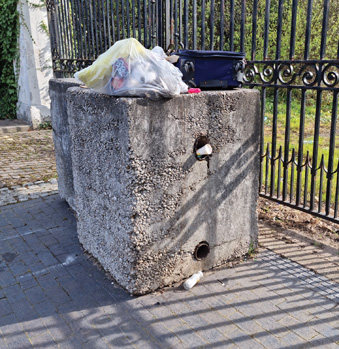Some councils in England will be awarded grants to tackle fly-tipping through trial projects, including CCTV, covert and overt, to target hotspots, says the Department for Environment, Food & Rural Affairs (Defra).
Defra Environment Minister Jo Churchill said: “When it comes to fly-tipping, enough is enough. These appalling incidents cost us £392 million a year and it is time to put a stop to them. I want to make sure that recycling and the correct disposal of rubbish is free, accessible and easy for householders. No one should be tempted to fly tip or turn to waste criminals and rogue operators.
“Furthermore, the funding that we have announced for local authorities will help them trial innovative new projects to put a stop to fly tipping. We will learn from the successes – and replicate them.”
As Defra says, the crime of fly-tipping blights urban and country places, poses a risk to public health, and costs to clear up – whether the private land owner, or local government; councils alone dealt with 1.13 million fly-tipping incidents in 2020/21, a rise of 16 per cent from 2019/20. Defra has collated some 60,000 fly-tipping incidents with construction, demolition and excavation material in 2020/21, an increase of 18pc from 2019/20. Defra points out that some councils charge for taking construction waste such as paving slabs and roofing materials. The Government is consulting on amending legislation so that householders cannot be charged for of DIY waste (the likes of household plasterboard, bricks and bath units) at recycling centres.
Newham Council in east London, for example, runs anti-fly-tipping advertising on buses, across social media, on poster sites across the area, in libraries and on a mobile billboard. In March, James Asser, Newham Cabinet Member for Environment, Highways and Sustainable Transport, said the council had collected nearly 3,000 tonnes of illegally dumped waste since December. As for how people can report fly-tips they see, in Newham it’s online at love.newham.gov.uk or by using the Love Clean Streets phone app. In south London, two temporary cameras will be installed in Purley and Croydon town centres to counter antisocial behaviour, street drinking, drug taking and fly-tipping, says Croydon Council.
Comment
David Renard is environment spokesperson for the Local Government Association (LGA). He said: “Councils, as the primary managers of environmental services are best placed to decide what works best for their areas.
“The disposal of non-household waste, such as DIY waste and tyres, is a non-statutory duty. As a result, some councils have had to introduce charges for this waste due to the rising costs of providing the service and the financial pressure they are under.
“Money raised from charges goes back into services so councils can continue to offer disposal facilities for these materials to residents, who would otherwise find them difficult to get rid of and will ensure that the system is not abused by those seeking to dispose of trade waste for free.
“To deal with pressures and ensure social distancing compliance during the pandemic, more councils introduced booking systems for recycling centres. Many have continued this practice as they have found it best suits the needs of their area.
“Manufacturers can improve recycling rates and deter fly-tipping by providing more take-back services so people can hand in old furniture and mattresses when they buy new ones.
“Our own polling shows eight out of ten people are happy with the way their local council collects their rubbish.”
Photo by Mark Rowe; fly-tip, Beckton, east London, sunny morning.









